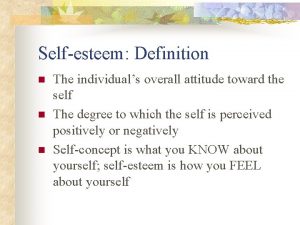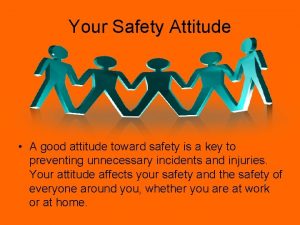Selfesteem Definition n The individuals overall attitude toward

















- Slides: 17

Self-esteem: Definition n The individual’s overall attitude toward the self The degree to which the self is perceived positively or negatively Self-concept is what you KNOW about yourself; self-esteem is how you FEEL about yourself

Findings about Self-Esteem n n Responsive to specific situations; can be temporary, depending on situation (success or failure) Temporary changes in self-esteem: called state self-esteem Can be manipulated in the lab (increased or decreased) and can be manipulated subconsciously Can be classically conditioned

Traits of those with high selfesteem n n n Think they’re more competent, likable, attractive, morally good, and intelligent than average Aren’t afraid to try new things because they believe they’ll succeed They know they have good traits and want others to think so, too.

Low self-esteem n n n Associated with the absence of strong positive views of self They have same goals as high SE people do; they want to be successful and have others like them. They lack confidence that they can achieve goals. Self-concept confusion: have conflicted ideas about self Focus on self-protection—try to avoid loss of esteem. More prone to emotional highs and lows

American epidemic of low selfesteem? n n Actually the opposite—we have unrealistically HIGH self-esteem in U. S. Efforts to boost self-esteem in recent decades has either been very successful or not necessary.

Depression and self-esteem n n n Depression has been known to be linked to low self-esteem since 1960 s. Has been hypothesized that depressed people have distorted views of themselves. Actually, depressed people don’t distort things much. It’s normal people who distort things.

Positive illusions: Cognitive distortions in normal people n n Overestimate good qualities; underestimate faults. Overestimate perceived control over event (More internal locus of control) Unrealistically optimistic. People can set these illusions aside temporarily while they make important decisions, though.

Benefits of self-esteem 1. Initiative: high SE fosters confidence. More willing to speak up and make new friends n More willing to go against others’ advice and do their own thing 2. Feels good: buffers against negative effects of bad events. Happier, more resilient n

Is high self-esteem always a good thing? n n n High SE has always been assumed to be preferable. Recent evidence suggests that it may not always be good. Many delinquents actually have high SE, not low as has traditionally been assumed. High SE people are sometimes considered obnoxious.

Narcissism n n Excessive love of self; selfish orientation Narcissism is a subset of high self-esteem. Some clinicians think that a low selfesteem is at the root of narcissistic behavior, but research doesn’t support this. Narcissists don’t care whether others like them, but they do want to be admired.

Self-esteem and sex n n Evidence shows that high SE may predispose girls (but not boys) to having sex by age 15. Virginity is often a positive status among females, but a negative one among males. For men, being a virgin at age 20 is a source of low self-esteem. Not true for women. High SE is a risk factor for getting pregnant b/c girls with high SE downplay risks.

Stability of self-esteem n n Four categories of self-esteem: stable high, stable low, unstable high, unstable low People with unstable high SE show the most hostility and defensive responding. When they experience failure, they feel threatened…could lead to aggression. Secure SE associated with long-term well-being. Fragile SE—SE is dependent on external sources —associated with stress, anger, relationship problems, drug & alcohol use, eating disorders

Basking in Reflected Glory n n Cialdini (1976): college students more apt to wear team shirts the Monday after a big football win. Called “BIRGing” or “basking in reflected glory. ” Lab-induced dip in SE leads to more “blasting” (saying a rival school is bad) and somewhat more basking. Blasting effect was stronger. A team’s win can impact self-esteem and selfconfidence in individual performance. The more one is a fan, the harder a loss to selfesteem.

Self-evaluation maintenance (Tesser) n n Three factors influence our self-esteem in interpersonal relationships: 1. How we perform a task relative to another person 2. How close we are to the other person. 3. How relevant the task is to our selfdefinition

BIRGing in relationships n When a close other performs well on a task that doesn’t mean anything to your selfesteem (doesn’t define who you are), then you take pleasure in their success. You can take pride in their accomplishment and experience a self-esteem boost by basking in their limelight.

Threat to self-esteem n n When a close other outperforms you on a task that’s relevant to your self-esteem, you have 3 choices about what to do: 1. Practice so that you’ll perform better than the other person. 2. Distance yourself from the other person. 3. Distance yourself from the task’s importance.

Sex differences in self-esteem n n Throughout the world, women have lower self-esteem than men do. Has to do with women’s position in society. They have lower status than men. Differences are most pronounced in white North Americans. No reliable gender differences in minorities. SE differences begin at puberty.
 Definition of selfesteem
Definition of selfesteem Selfesteem definition
Selfesteem definition Savukku nora money
Savukku nora money Author’s attitude
Author’s attitude What were daisy's assets as an eighteen year old
What were daisy's assets as an eighteen year old Why do you think has grete's attitude toward gregor changed
Why do you think has grete's attitude toward gregor changed Fernando's favorable attitude toward capital
Fernando's favorable attitude toward capital What is the attitude of the narrator toward rachel/rachelle
What is the attitude of the narrator toward rachel/rachelle Hình ảnh bộ gõ cơ thể búng tay
Hình ảnh bộ gõ cơ thể búng tay Ng-html
Ng-html Bổ thể
Bổ thể Tỉ lệ cơ thể trẻ em
Tỉ lệ cơ thể trẻ em Gấu đi như thế nào
Gấu đi như thế nào Tư thế worm breton
Tư thế worm breton Alleluia hat len nguoi oi
Alleluia hat len nguoi oi Môn thể thao bắt đầu bằng từ đua
Môn thể thao bắt đầu bằng từ đua Thế nào là hệ số cao nhất
Thế nào là hệ số cao nhất Các châu lục và đại dương trên thế giới
Các châu lục và đại dương trên thế giới

































